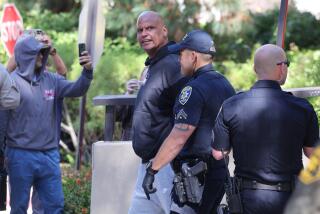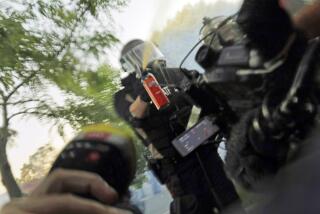China In Turmoil : Protests For Democracy : Gunfire, Shouts Heard Live as 2 From CBS Are Arrested : Soldiers Scuffle With U.S. Journalists
- Share via
NEW YORK — In a harrowing moment heard but not seen by millions of Americans, Chinese soldiers Saturday struggled with and arrested a CBS correspondent and his cameraman as they covered the bloody end of mass demonstrations in Beijing.
A hand-held cellular telephone used by reporter Richard Roth continued to work as he and three CBS technicians scuffled with Chinese soldiers. The live CBS News broadcast carried the sounds of gunfire, screams and Chinese voices.
The arrest of Roth and cameraman Derek Williams came on a day when all three major networks and the Cable News Network aired live reports from their correspondents in Beijing. In the reports, automatic weapons fire could clearly be heard at times, and one ABC correspondent, Kyle Gibson, said she had been pinned down by gunfire three times--the last time by a sniper outside a hotel where she and others sought refuge.
Despite the widespread carnage in Tian An Men Square, Gibson was not wounded and Roth and Williams were not believed hurt, CBS said.
Roth and Williams were taken into custody at gunpoint by soldiers and taken to the Great Hall of the People near the square.
“We’re making every effort to get them out,” CBS spokesman Tom Goodman said in Los Angeles.
The two CBS newsmen in Beijing were arrested as Roth was making his report via the cellular phone in Tian An Men Square. His report to anchorman Bob Schieffer here was aired Saturday afternoon.
Video coverage of the bloody end of the demonstrations was banned by martial law and, although no reporters or cameramen were supposed to be on the scene, many of them had been ignoring the martial-law regulations.
‘Got to Get Out of Here!’
“OK, we’ve got to get out of here!” Roth said as soldiers closed in on him and Williams shortly after 5 a.m. Beijing time.
Shouts were heard, then Roth said, “They’re after Derek now. They’re ripping away his camera. They’re ripping away his camera and they’re coming for us. We’re trying to move back and move away!”
More shouts were heard. Roth, panting, then cried, “Oh, no! Oh, no! Stop! Oh, no!” There was a sound of a scuffle, then what sounded like someone was being hit, then the sound of someone--apparently Roth--furiously dialing his cellular phone before communication was broken.
The dramatic moment, heard on one of many CBS special reports that aired Saturday, was taped and replayed on Saturday’s “CBS Evening News.”
Schieffer said that the phone continued to work after Roth was taken away.
“We could still hear noise in the background,” said Schieffer, who had been speaking over the cellular phone hookup with Roth for most of the day. “What we think happened was they dragged him off but they dropped the telephone and the line stayed open.”
Bursts of Gunfire Heard
CBS taped the sounds coming over the open phone line and played them as background for its later news broadcasts. Sporadic bursts of gunfire and the sound of heavy vehicles could be heard.
The CBS Evening News, like other network newscasts, relied on live phone reports and, for the most part, still photographs in Tian An Men Square that were carried out of Beijing by courier.
Some of the still photos were taken by network correspondents, such as NBC’s Arthur Kent, who also reported seeing “one soldier and one APC (armored personnel carrier) driver beaten to death” by students outraged at the use of force to end their long demonstration in Beijing.
CNN video footage taken during daylight Saturday in Beijing showed students hitting what CNN called a high-ranking official as he sat in his car, trapped by the throngs around him.
In her live report to ABC, Gibson, who had been on a street near Tian An Men Square, reported coming under fire after army tanks advanced on rock-throwing student demonstrators.
She and the students retreated down an alley toward the Beijing Hotel a short distance from the square, she said.
At one point, she said, “We were pinned down by some pretty heavy gunfire” for three minutes, and then again as she made her way to the hotel’s parking lot.
Then, she said, “We got trapped right outside the door to the hotel. There was some sort of sniper (shooting) and they (hotel officials) would not let us in . . . even though there was a sniper shooting over our heads, they wouldn’t let us in until the people basically forced them to.”
More to Read
The biggest entertainment stories
Get our big stories about Hollywood, film, television, music, arts, culture and more right in your inbox as soon as they publish.
You may occasionally receive promotional content from the Los Angeles Times.










